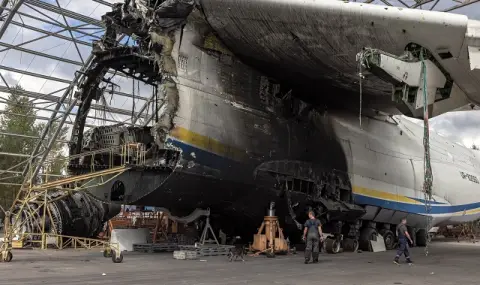Russian forces continue to shell Ukrainian energy infrastructure amid ongoing negotiations on the details of the ceasefire agreement.
This indicates that Russia can use the unclear or inconclusive terms to strike with shorter-range artillery, but not with longer-range cruise missiles or single-target strike drones.
Ukrainian Foreign Minister Andriy Sibikha and the head of the Kherson Oblast Military Administration, Alexander Prokudin, said on April 1 that Russian forces shelled energy infrastructure in the city of Kherson on the morning of April 1, leaving at least 45,000 Kherson residents without electricity.
This was reported by the Institute for the Study of War (ISW).
Sibiha said on April 1 that Russian forces had recently violated the ceasefire on energy infrastructure several times.
A moratorium on long-range strikes is said to be in place, but the terms remain unclear.
Ukrainian President Volodymyr Zelensky said on March 11 that Ukraine was proposing a "temporary ceasefire" that would include strikes with "long-range missiles, bombs and drones."
U.S., Ukrainian and Russian officials reached some agreements on a temporary ceasefire on March 25, but did not provide details.
Russian forces are likely to continue using their positions on the eastern (left) bank of the Dnieper River and other frontline areas to shell and destroy.
Senior Russian officials continue to reiterate their demand for the removal of "root causes" of the war in Ukraine as a prerequisite for a peace agreement - a reference to Russia's initial military demands that directly contradict US President Donald Trump's goal of achieving a lasting peace. Russian Deputy Foreign Minister Sergei Ryabkov said on April 1 that the Trump administration was trying "some scheme" to first achieve a ceasefire and then move on to "other models and schemes" to end the war.
Furthermore, Ryabkov argued that Russia could not accept the US proposal in this form. Senior Russian officials have repeatedly identified these root causes as NATO's alleged violation of its obligations not to expand eastward and Ukraine's alleged violations of the rights of Russian-speaking minorities.
The Kremlin's demands amount to a demand for Ukraine's complete surrender with the establishment of a pro-Russian government and long-term commitments to neutrality - demands that Putin has been making since before February 2022.
US State Department spokeswoman Tammy Bruce said on March 31 that Trump had not appreciated Russia's offer to establish an "interim administration" in Ukraine.
Bruce also noted that Trump understood that the negotiations would "require both Russia and Ukraine to make difficult decisions and compromises." Russia has so far refused to make any concessions and rejected the US-Ukrainian 30-day general ceasefire when Trump spoke with Putin on March 18.
Russian forces are expanding their bridgehead northeast of Liman as part of a mutually reinforcing effort to create the conditions for a takeover in the coming months. Footage released on March 28 and geolocated on April 1 shows that they have recently advanced northeast of Liman and may have captured Novolyubivka.
Russian forces have recently made a confirmed advance southeast of Nove (west of Novolyubivka), and Ukrainian military observer Konstantin Mashovets stated on March 31 that Russian forces had advanced to the southern outskirts of Katerynovka (northwest of Novolyubivka).
A Russian blogger stated on April 1 that Russian forces were attempting to connect their bridgehead near Novolyubivka with a smaller bridgehead on the west bank near Makeyevka (about eight kilometers away).
Russian forces may be attempting to unite these bridgeheads to create a stable salient that could support attacks southeast of Borova. Russian forces have recently struggled to advance east and southeast of Borova, having advanced northeast of the settlement in January 2025, and Russian forces may support future offensive operations against the southern end of the Novosergievka-Druzhlyubovka-Novy Mir line (east-southeast of Borova).
The Russian military command may attempt to bypass Ukrainian defenses in these settlements to force Ukrainian troops to withdraw and enable the Russians to advance east of and into Borova in the coming months.
Russian officials have long cited the capture of Donetsk and Luhansk regions as a goal of Russia’s full-scale invasion of Ukraine and have repeatedly pushed for international recognition of Russia’s annexation of Luhansk, Donetsk, Zaporizhia, and Kherson regions as a condition for peace, even though Russian forces do not fully control any of these regions.
The Kremlin is likely to use the second capture and hold of Luhansk region to gain leverage during ongoing ceasefire negotiations and future peace talks, which ISW continues to assess as a key motivating factor for the recent increased ground activity of Russian forces in Ukraine.
The Kremlin could also use the capture of Luhansk region as a significant victory for its domestic audience and to justify years of brutal personnel losses in Ukraine. ISW continues to assess that Russian officials are deliberately delaying the ceasefire and peace talks in the hope of gaining more territory to use during future peace talks.
Putin signed a decree on April 1 to increase the salaries of Russian governors from January 2026, bringing them on par with those of Russia’s deputy prime ministers.
The delayed salary increase is likely intended to further ensure loyalty amid ongoing uncertainty about Russia’s future, specifically, Russia’s ongoing military effort and the macroeconomic health of the Russian economy.
The decision to implement this change in 2026 rather than immediately could give the Kremlin time to rebalance its budget and gather resources to support the spending increase, as the Russian government has already approved Russia’s 2025 budget. in late 2024.
Putin signed a decree in December 2024 approving the 2025 federal budget and the draft federal budget for 2026-2027, which will prioritize spending on Russia's national security and defense.
Putin has not signed such a decree earlier, likely due to the ongoing economic strain from the war in Ukraine and Western sanctions against Russia. Russia continues to face huge war-related costs, with growing economic strains, labor shortages, and systemic corruption threatening the sustainability of Russia's defense industrial base.
